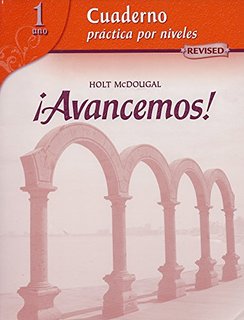
All Solutions
Page 29: Gramatica C
The objective of this exercise is to practise the use of articles in Spanish.
Subjects and predicatives are given for each sentence. As you read the sentences thoroughly, you will notice that the predicatives match all grammatical features with those of the subject, and that both elements match all possible grammatical features with the verb. Having this in mind, use the adecuate form of the definite or indefinite article to complete the sentences. Below, you will find an analysis for reference.
Nosotros somos _ estudiantes de Buenos Aires.
First, you see that all three elements are in their plural forms. This means that you will also use a plural form of the article.
Next, take a closer look at the subject. By now, you have learned that Spanish differentiates between “we (male)” and “we (female)”: “nosotros” and “nosotras”, respectively. Logically, this points at the masculine form in plural of the article.
The final step is to determine whether you would use a definite or an indefinite article. Think of the context. The first thing that comes to you is that there is no context. This is normal for grammar exercises, however if a sentence was isolated for an exercise, it must have been isolated from a context. This already gives you a clear idea that both the definite and the indefinite articles would be fine to use. This means that your sentence would look like this:
Example 1: Nosotros somos unos estudiantes de Buenos Aires.
Example 2: Nosotros somos los estudiantes de Buenos Aires.
In case you go ahead and use “los”, remember to always present a hypothetical context, which would be something along these lines:
A: Hola. ¿Sois estudiantes?
B: Hola. Sí, somos estudiantes.
A: ¿Sois de Chile?
B: No, nosotros somos los estudiantes de Buenos Aires. Esos chicos ahí son de Chile.
This explanation applies to points 1, 2 and 4. Regarding point number 3, it is rather difficult to imagine a context where “las” would be used since it is a description of a group of people. In this case, you would naturally use the indefinite article. You may refer to the below solutions for further reference.
2. unos / los
3. unas
4. un / el
The purpose of this exercise is to practise the shift of words or phrases from singular to plural.
Sentences are given in singular and parts of them are underlined. These underlined bits need to be changed into plural.
By now, you have already learned how to create plural forms for nouns in Spanish. You may also have noticed that they behave in a very similar way as in English: you add “-s” to the stem, or “-es” if it ends in a consonant.
Verbs, on the other hand, have conjugated forms for the plural. You have already learned how to use the verb “ser”, especially with personal pronouns, which also have separate forms in the plural. In this task, apply all of the above to shift the sentences into plural.
Remember: in Spain, the plural of “tú” is “vosotros”. It corresponds to the second grammatical person in plural. In the Americas, “vosotros” is not used at all. Instead, the plural of “tú” would be “ustedes”, which uses the third grammatical person in plural. You may use the below solutions for further reference.
2. Ellas son las amigas de Texas.
3. Me gusta beber los jugos.
4.A. Vosotros sois unos estudiantes atléticos.
4.B. Ustedes son unos estudiantes atléticos.
The purpose of this exercise is to practise describing someone whilst using the indefinite article.
This is a personal question since you have to describe people you know. You will be describing their permanent features using the verb “ser”. Since the task is to use the indefinite article, you will need to introduce a predicative and describe it.
Example: Yo soy un chico alto.
In the above example, “chico” is the predicative. Had we omitted this word, there would have been no need for the indefinite article (“un”). Below, you will find further examples of how your sentences should look like. Use them only as references since the task is to describe people you know.
1. Diego es un chico muy atlético.
2. La maestra es una mujer inteligente.
3. Los vecinos de María son unas personas perezosas.

